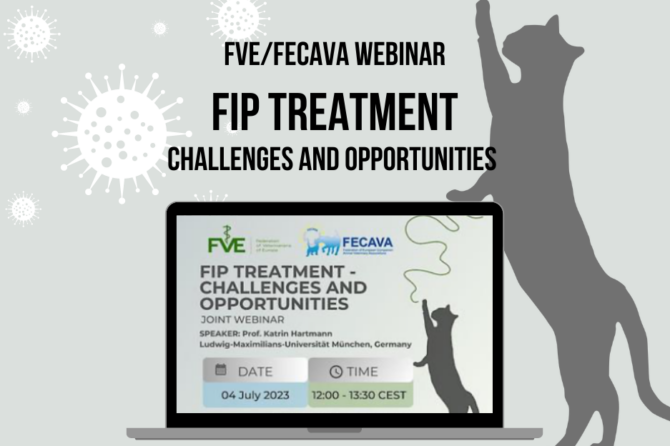
FVE and FECAVA Collaborate to Address Feline Infectious Peritonitis (FIP) Treatment Challenges
The Federation of Veterinarians of Europe (FVE) and the Federation of European Companion Animal Veterinary Associations (FECAVA) recently organized a highly successful webinar to discuss the challenges and opportunities associated with treating Feline Infectious Peritonitis (FIP). The event witnessed active participation from scientists, practitioners, competent authorities, pharmaceutical industry representatives, and policymakers.
During the webinar, Thierry Chambon, FVE Past Vice-President, warmly welcomed the 150 participants and shared his personal experience with the burden and dilemma posed by FIP. Traditionally, this debilitating disease presented a grim prognosis, often resulting in euthanasia within days. However, recent groundbreaking research has led to the development of new treatment options, transforming the once-lethal condition into a manageable disease.
The primary goals of the webinar were to raise awareness about FIP, share the latest research findings and breakthroughs, explore potential solutions for legal constraints, and foster an environment for open-minded discussion.
FIP is caused by a mutation of the feline coronavirus (FCoV), and until recently, affected cats had limited treatment options. However, promising research results have offered hope, as new drugs have proven effective in curing this previously fatal disease. Unfortunately, many countries do not allow veterinarians a legal option to use these new effective treatment options. This ethical dilemma has prompted FVE and FECAVA to collect data from various EU and non-EU countries regarding the availability of FIP treatments. Both organizations have jointly advocated in a letter to the Heads of Medicines Agency (HMA), urging the release of a small quantity of the medicine Remdesivir, known as Veklury in the market, to be made accessible to veterinarians.
Today, reconsidering and re-evaluating FIP treatment options are of utmost importance. Over four decades, veterinary researchers have dedicated their efforts to studying FIP. The recent joint webinar concluded with three clear recommendations.
Firstly, monitoring FIP prevalence at national and European levels is crucial, particularly in countries with increased cases. By closely tracking the disease’s spread, a better understanding of its impact can be gained, leading to timely interventions.
FVE and FECAVA strongly advocate for increased research efforts to develop effective FIP vaccines.
Lastly, policymakers are urged to provide veterinarians with a legal option to treat FIP-affected cats, such as allowing the use of Remdesivir or GS-441524. This step is essential to ensure owners no longer feel compelled to resort to the illegal market in their desperate search for life-saving treatments for their beloved pets.
Implementing these recommendations will enable significant progress in combating FIP and providing hope to veterinarians and owners who face the challenges posed by this devastating disease.
More information on the links below:
The presentation from Prof. Professor Katrin Hartmann (PDF)
The presentation from Emma Jones, BOVA Specials (PDF)
The presentation from Dr. Sam Taylor (PDF)
News on FVE webpage with FIP Statement from the perspective of owners’ interest groups and FIP Warriors Europe with additional information for vets
Detailed Report (PDF)
News in The Times: Will feline coronavirus spread to UK after killing cats in Cyprus?
The full recording is available below.
Leave a reply

Elevate your online presence with our Managed Dedicated Server services in Canada. Experience top-tier performance and reliability, coupled with expert management and support. Our Managed Dedicated Server Canada ensures low-latency connections and compliance with local regulations. Focus on your business while we handle the technical aspects. Trust in our Managed Dedicated Server solutions for a seamless online experience.
ReplyToday, I was just browsing along and came upon your blog. Just wanted to say good blog and this article helped me a lot, due to which I have found exactly I was looking.
Reply